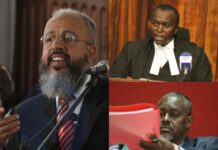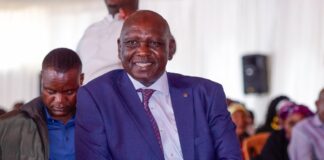Kenya is ready to lead a multinational force in Haiti and will deploy 1,000 police officers to the strife-torn Caribbean nation once its offer is accepted, Foreign Affairs Cabinet Secretary Alfred Mutua has said.
“At the request of Friends of Haiti Group of Nations, Kenya has accepted to positively consider leading a Multi-National Force to Haiti,” Mutua said.
“Kenya’s commitment is to deploy a contingent of 1,000 police officers to help train and assist Haitian police to restore normalcy in the country and protect strategic installations.”
Gangs control about 80% of the Haitian capital, and violent crimes such as kidnappings for ransom, armed robbery and carjackings are common.
United Nations Secretary-General Antonio Guterres and Haitian Prime Minister Ariel Henry have for nearly a year sought international intervention to help support the police, but no country had stepped forward.
Its proposed deployment still required a mandate from the U.N. Security Council and approval from domestic authorities, said Mutua.
U.S. Secretary of State Antony Blinken spoke by phone Friday night to Kenyan President William Ruto, according to State Department spokesperson Matthew Miller.
Despite her own security challenges due to Alshabaab and bandits in the north, Kenya is seen as a democratic anchor in East Africa and has participated in peacekeeping operations in its immediate region including in the Democratic Republic of Congo and Somalia.
Haiti, the Western Hemisphere’s poorest nation, has seen compounding humanitarian, political and security crises, with gangs controlling most of Port-au-Prince.
Guterres said this month that violence had continued “to escalate and spread,” citing killings, kidnappings, rape of women and girls, looting, and the displacement of thousands of people.
Guterres, relaying a request from Henry, began calling in October for an international, non-U.N. deployment to help support police in the troubled nation.
The Security Council this month adopted a unanimous resolution encouraging member states “to provide security support to the Haitian National Police,” including through “the deployment of a specialized force.”
But the text, which focused on a one-year extension of the mandate for the special U.N. political mission to Haiti, BINUH, stopped short of making direct plans for such a force.
The council has asked Guterres to present by mid-August a report on all possible options, including a U.N.-led mission.
Earlier this month, Blinken said the U.S. remained active in its search for a country to head a multinational force in Haiti.
This week, Washington ordered nonessential personnel and family members of government employees to leave the country.
Staff at the U.S. embassy in Port-au-Prince already live under tight security — confined to a protected residential area and forbidden to walk around the capital or use any public transport or taxis.



















